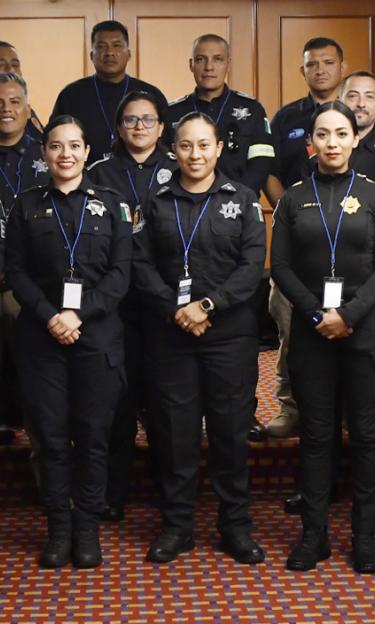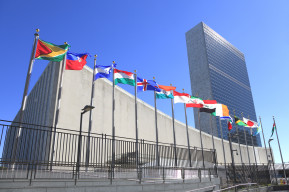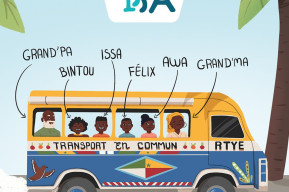News
Training for security forces in Mexico begins to strengthen capacities on the exercise of press freedom, access to information and security of journalists

- The three-day workshop has aim to recognize the importance of police action in the defence of freedom of expression by deepening the understanding of the national legal framework, and regional and international standards, as well as promoting dialogue between law enforcement officers and journalists and communicators.
- Police officers formed as instructors from 17 states of the country participate and will replicate the training in their respective workspaces.
Mexico City, March 17, 2023. The series of pieces of training that UNESCO has implemented around the world to share good practices and strategies for the capacities of public security forces personnel to strengthen freedom of expression and the safety of journalists begin for the first time in Mexico.
Officials Security and police training institutions which are participate come from the states of Baja California, Chiapas, Chihuahua, Mexico City, Coahuila, State of Mexico, Guanajuato, Guerrero, Michoacán, Morelos, Oaxaca, Puebla, Quintana Roo, Sonora, Veracruz, Yucatan and Zacatecas.
The National Workshop for Police Institutions on Freedom of Expression, Access to Information and Security of Journalists is carried out from March 15 to 17 in Mexico City. This activity is organized by UNESCO and the Institute for Security and Democracy (INSYDE) and gives continuity to the regional workshop for trainers of police academies and schools held in 2022 in Bogotá, Colombia, by the UNESCO Regional Office of Sciences for Latin America and the Caribbean, based in Montevideo.
National and international specialists from security forces, the Special Prosecutor's Office for Attention to Crimes committed against Freedom of Expression, civil society and journalists provide recommendations and techniques to improve communications, the supply of information to the press and citizens, as well as their performance in situations such as protests and demonstrations. Among the facilitators are professionals from the Section for Freedom of Expression and the Security of Journalists at UNESCO Headquarters, from the Police Applied Investigation area of INSYDE, as well as from the Generalitat-Mossos d'Esquadra Police from Catalonia (Spain).
Alejandra Ramírez Maciel, Master Commissioner and General Director of Police Career of the Secretariat of Citizen Security of the Government of Mexico City, said at the inauguration of the workshop: "the police institutions are governed by the principles of legality, objectivity, efficiency, professionalism, honesty and respect for human rights. Police institutions have to implement actions that contribute to the comprehensive protection of the safety of journalists to eradicate attacks and crimes against them, with special emphasis on the safety of women journalists and any violence against women. I hope this course brings you tools and knowledge for professional attention”.
Mehdi Benchelah, Senior Project Officer of the Section for Freedom of Expression and the Safety of Journalists indicated that “since 2013, UNESCO has carried out a training program for security forces. UNESCO has developed toolkits and guidelines to support these issues and has trained more than 11,500 law enforcement and security officers on freedom of expression and the safety of journalists. I must say, that we had a great interest in the massive open online course launched last year by UNESCO and the International Police Association, which had more than 500 participants from Mexico, which is a significant number.”
According to the UNESCO Observatory, almost 1,000 journalists have been murdered worldwide since 2012, with 86% impunity. In Mexico, 148 journalists have been assassinated from 2006 to February 2023, including 19 of them in 2022.
The public security forces that have greater knowledge and skills to promote freedom of expression and access to information contribute to strengthening democracy and trust in institutions. The initiative is essential in a country where 69% of the population considers that there is censorship and limitation of expression, where 94% whom practice journalism report self-censoring out of fear, and 96.7% consider that journalism is exercised at risk, according to national surveys carried out as part of the country's implementation of the UNESCO Media Development Indicators.
This initiative has been possible thanks to the support of the International Program for the Development of Communication (IPDC), funded by the Government of the Netherlands, and the Multi-Donor Program on Freedom of Expression and Security of Journalists (MDP).
Learn more about the report "Journalism is a Public Good: Global Trends in Freedom of Expression and Media Development: Global Report 2021/2022", the 10th Anniversary of the United Nations Plan of Action on the Safety of Journalists and the Issue of Impunity, and the 30th anniversary of the proclamation of World Press Freedom Day.











